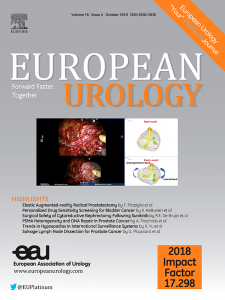The Importance of Being Grade 3: A Plea for a Three-tier Hybrid Classification System for Grade in Primary Non–muscle-invasive Bladder Cancer
IF 25.3
1区 医学
Q1 UROLOGY & NEPHROLOGY
引用次数: 0
Abstract
Grade is an important determinant of progression in non–muscle-invasive bladder cancer. Although the World Health Organization (WHO) 2004/2016 grading system is recommended, other systems such as WHO1973 and WHO1999 are still widely used. Recently, a hybrid (three-tier) system was proposed, separating WHO2004/2016 high grade (HG) into HG/grade 2 (G2) and HG/G3 while maintaining low grade. We assessed the prognostic performance of HG/G3 and HG/G2. Three independent cohorts with 9712 primary (first diagnosis) Ta-T1 bladder tumors were analyzed. Time to progression was analyzed with cumulative incidence functions and Cox regression models. Harrell’s C-index was used to assess discrimination. Time to progression was significantly shorter for HG/G3 than for HG/G2 in multivariable analyses (cohort 1: hazard ratio [HR] = 1.92; cohort 2: HR = 2.51, and cohort 3: HR = 1.69). Corresponding progression risks at 5 yr were 18%, 20%, and 18% for HG/G3 versus 7.3%, 7.5%, and 9.3% for HG/G2, respectively. Cox models using hybrid grade performed better than models with WHO2004/2016 (all cohorts; p < 0.001). For the three cohorts, C-indices for WHO2004/2016 were 0.69, 0.62, and 0.75, while, for hybrid grade, C-indices were 0.74, 0.68, and 0.78, respectively. Subdividing the HG category into HG/G2 and HG/G3 stratifies time to progression and supports the recommendation to adopt the hybrid grading system for Ta/T1 bladder cancers.
3级的重要性:原发性非肌层浸润性膀胱癌的三级混合分级系统诉求。
分级是非肌层浸润性膀胱癌病情发展的重要决定因素。尽管推荐使用世界卫生组织(WHO)2004/2016 分级系统,但 WHO1973 和 WHO1999 等其他系统仍在广泛使用。最近,有人提出了一种混合(三级)系统,将WHO2004/2016高级别(HG)分为HG/2级(G2)和HG/G3,同时保留低级别。我们评估了 HG/G3 和 HG/G2 的预后表现。我们对三个独立队列的9712例原发性(首次诊断)Ta-T1膀胱肿瘤进行了分析。通过累积发病率函数和 Cox 回归模型分析了肿瘤进展时间。Harrell's C-指数用于评估区分度。在多变量分析中,HG/G3的进展时间明显短于HG/G2(队列1:危险比[HR] = 1.92;队列2:HR = 2.51;队列3:HR = 1.69)。HG/G3与HG/G2相比,5年的相应进展风险分别为18%、20%和18%,而HG/G2分别为7.3%、7.5%和9.3%。使用混合分级的 Cox 模型比使用 WHO2004/2016 的模型表现更好(所有队列;p
本文章由计算机程序翻译,如有差异,请以英文原文为准。
求助全文
约1分钟内获得全文
求助全文
来源期刊

European urology
医学-泌尿学与肾脏学
CiteScore
43.00
自引率
2.60%
发文量
1753
审稿时长
23 days
期刊介绍:
European Urology is a peer-reviewed journal that publishes original articles and reviews on a broad spectrum of urological issues. Covering topics such as oncology, impotence, infertility, pediatrics, lithiasis and endourology, the journal also highlights recent advances in techniques, instrumentation, surgery, and pediatric urology. This comprehensive approach provides readers with an in-depth guide to international developments in urology.
 求助内容:
求助内容: 应助结果提醒方式:
应助结果提醒方式:


